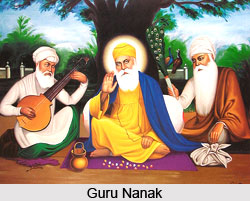 Spirituality in Sikhism was practiced by all ten Gurus. Guru Nanak was a religious person who was not concerned with providing rational answers to the various questions of human life. In one of his hymns, he tells his disciples how he had received the divine message and the manner in which it is delivered to others.
Spirituality in Sikhism was practiced by all ten Gurus. Guru Nanak was a religious person who was not concerned with providing rational answers to the various questions of human life. In one of his hymns, he tells his disciples how he had received the divine message and the manner in which it is delivered to others.
Guru Nanak`s basic concern in life was the human need, which he expressed at the beginning of Japji Sahib, in the form of a question:
Kiva saciara hoia Kirva kurai tutai pali.
Throughout his life he was engaged with this question as it is related to a universal human need. However he found an answer to his question based upon his personal spiritual experience. Guru Nanak Dev has clearly rejected the existing spiritualities based upon the traditional Indian religious thinking, which include ways connected with `ascetic`, yuga and `knowledge`. He proposed an alternate spirituality that was based upon his personal religious experiences.
He had spread his spirituality throughout his hymns and other Gurus have followed him. He also formulated five stages of spiritual development, which he has stated in Japuji Sahib. They are Dharam Khand (the realm of duty), Gyan Khand (the realm of knowledge), Saram Khand (the realm of the bliss), Karam Khand (the realm of grace) and Sachi Khand (the realm of truth).
It is from these five spiritual developments from where one can develop moral, intellectual, aesthetic and spiritual capacities and experience and ultimate Reality. Guru Nanak`s theme was further developed by the other nine Gurus. During the development of spiritual thoughts based upon the experience of various Gurus, number of expressions came in use, which is used by the Sikh believers. One of the most important expressions is Sahaj which is applied to human beings and it implies practice of voluntary and gradual discipline of the body and mind.
The other important expressions are: deg-tegh, miri-piri and sant-sipahi. Deg-tegh means a big cooking pot and tegh means word. This was used to express the idea of `service` and `protection`.
This article is a stub. You can enrich by adding more information to it. Send your Write Up to content@indianetzone.com




















